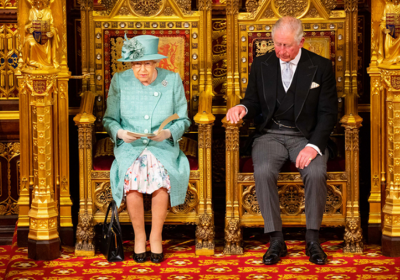It is with sincere joy that I address this first greeting to the representatives of the nation.
You know the events which brought about some months ago the division of the Hellenic State, but the benevolent solitude of the protecting powers of Greece succeeded, without sacrifices or an internal struggle, in reconstituting the national unity by the reestablishment of liberal institutions.
The conditions upon which the transmission of the royal power was effected have clearly shown the path to be followed in the future. They render necessary the appeal to the national sovereignty, so as to revise and consolidate at the same time as the throne a form of government established on the basis demanded by the popular will, to decide in the most precise fashion the extent of the sovereign rights of the people as well as the extent of the royal authority as defined by the Constitution, by giving it the democratic character which is the desire of the dynasty.
«The royal power resides in the love of the people,» but foreign events should not permit the immediate convocation of the National Assembly, and that is why, in order to inaugurate the new constitutional era which we are entering, we have repealed the decree which by a violation of the Constitution dissolved the Chamber, and have convoked this Chamber for its regular second session.
Gentlemen, I am glad to inform you that my Government, faithful to national tradition, has already given its foreign policy the orientation approved by the people at the elections of May 31 and ratified by the Chamber.
After two glorious wars Greece desired peace, of which she had great need, in order to retrieve her sacrifices and to regain her strength with a view to reorganizing the State recently enlarged, and to render it capable of accomplishing its great civilizing mission in the East. Greece was therefore grieved to see a new war break out which would result in a general conflagration, setting against one another two worlds, two civilizations, and two opposed conceptions of nationalities and of humanity.
Indeed, it would have been sufficient for little Greece to remember her traditions, her history, and her duty in order not to hesitate spontaneously to offer her feeble forces to that group in the conflict whose war aim was to defend the rights of nationalities and the liberty of peoples.
But more imperious obligations called Greece into the same camp, and she has therefore now adopted an attitude which duty and honour imposed upon her toward the brave and chivalrous ally – the defence of the rights of Hellenism and the debt of gratitude contracted for her original liberation and for the protection which she has always enjoyed.
If it had been given to the entire nation to follow as soon as possible such a policy, it would more rapidly and more effectively have assured the defence of the country against the hereditary enemy.
Part of the Greek Army has fortunately had occasion to prove at the front its value and morale by heroic acts, thanks to which Greece has been able to regain the esteem of the allied armies and foreign public opinion, and her prestige, until then so deeply sullied, and to avoid the national catastrophes which were threatening her.
The heroism and self-sacrifice of the troops at the front are a most happy augury for the ultimate fate of the struggle undertaken by united Greece, for they are evidence of the fine pride and gallantry of the Hellenic Army.
Faithful to this policy, my Government has already recalled the representatives of Greece from the capitals of the enemy countries. The first result of this policy has been the decision taken at the last conference in Paris to re-establish in its integrity the sovereignty of the State by the abolition of all the controls recently imposed, and by the evacuation of the Epirus and the other regions occupied by the Allies.
Greece is justly proud to have found in this conference the same consideration as her powerful protectors and allies. My Government will submit to you the legislative measures necessitated by the needs of the war, convinced that it will have your whole support, but the country has other needs than these as the result of the existence of a state of war.
I appeal to your unanimous aid in studying the measures indicated in the present circumstances as regards the economical situation of the State and the country.
Gentlemen, never has the country passed through a more serious period. Greece has to defend her territory against barbarous aggressors. But if in the trials of the past Greece has been able, thanks to the civilizing strength of the morale of the race, to have overcome the conquerors and to rise free amidst the ruins, today it is quite a different matter.
The present cataclysm will decide the definite fate of Hellenism, which, if lost, will never be restored. I am convinced that to accomplish the great and difficult task which the country has undertaken it will have assistance equal to the danger of which you are aware.
I am also certain that the self-sacrifice of the Hellenic people will rise to the heights demanded by the struggle to which we have been called by the supreme care of our national defence, and for which I wish success by invoking the Divine assistance.
Enviado por Enrique Ibañes















